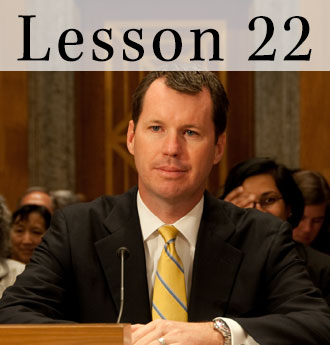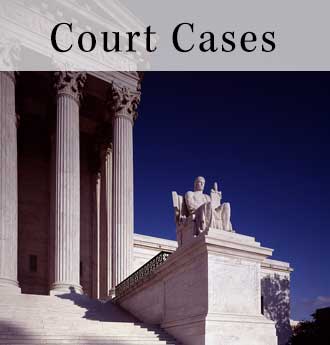Lesson 22: How Does Congress Perform Its Functions in the American Constitutional System?
The case summaries below were provided by Oyez and licensed under the Creative Commons Attribution-NonCommercial 4.0 International License. Please visit Oyez.org for more case summaries.
National Labor Relations Board v. Jones and Laughlin Steel (1937)
Facts of the case:
With the National Labor Relations Act of 1935, Congress determined that labor-management disputes were directly related to the flow of interstate commerce and, thus, could be regulated by the national government. In this case, the National Labor Relations Board charged the Jones & Laughlin Steel Co. with discriminating against employees who were union members.
Case Question:
Was the act consistent with the Commerce Clause?
Case Conclusion:
Yes. The Court held that the act was narrowly constructed so as to regulate industrial activities which had the potential to restrict interstate commerce. The justices abandoned their claim that labor relations had only an indirect effect on commerce. Since the ability of employees to engage in collective bargaining (one activity protected by the act) is "an essential condition of industrial peace," the national government was justified in penalizing corporations engaging in interstate commerce which "refuse to confer and negotiate" with their workers.
Citation:
The Oyez Project, NLRB v. Jones & Laughlin Steel Corp., 301 U.S. 1 (1937)
Link to case: https://www.oyez.org/cases/1900-1940/301us1
Powell v. McCormack (1969)
Facts of the case:
Representative Adam Clayton Powell had been embroiled in scandal both in Harlem and in Washington. He won reelection in 1966 but the House of Representatives voted to exclude him from taking his seat, strip him of his seniority, fine him, and declare his seat vacant.
Case Question:
May the House of Representatives exclude a duly elected member if the member has satisfied the standing requirements of age, citizenship and residence as articulated in Article I, Section 2 of the U.S. Constitution?
Case Conclusion:
No. The Court noted that the proceedings against Powell were intended to exclude and not expel him from the chamber. That is an important distinction to recognize since the House does have the power, under Article I, Section 5, to expel members. However, expulsion was not the purpose of the proceedings in this case. After analyzing the Framers' debates on this issue, Chief Justice Warren concluded that since Powell had been lawfully elected by his constituents and, since he met the constitutional requirements for membership in the House, that the chamber was powerless to exclude him.
Citation:
The Oyez Project, Powell v. McCormack, 395 U.S. 486 (1969)
Link to case: http://oyez.org/cases/1960-1969/1968/1968_138
PGA Tour, Inc. v. Martin (2001)
Facts of the case:
Casey Martin is afflicted with a degenerative circulatory disorder that prevents him from walking golf courses. His disorder constitutes a disability under the Americans with Disabilities Act of 1990 (ADA). When Casey made a request to use a golf cart for the duration of the qualification tournament onto the professional tours sponsored by PGA Tour, Inc., PGA refused. Martin then filed suit under Title III of the ADA, which requires an entity operating "public accommodations" to make "reasonable modifications" in its policies "when...necessary to afford such...accommodations to individuals with disabilities, unless the entity can demonstrate that making such modifications would fundamentally alter the nature of such...accommodations." Ultimately, the district court entered a permanent injunction against PGA, requiring it to allow Martin to use a cart. The court found that the purpose of the PGA's walking rule was to insert fatigue into the skill of shot-making, and that Martin suffered significant fatigue due to his disability, even with the use of a cart. In affirming, the court of appeals concluded that golf courses are places of public accommodation during professional tournaments and that permitting Martin to use a cart would not fundamentally alter the nature of those tournaments.
Case Question:
Does the Americans with Disabilities Act of 1990 provide access to professional golf tournaments by a qualified entrant with a disability? May a disabled contestant be denied the use of a golf cart because it would "fundamentally alter the nature" of the tournaments to allow him to ride when all other contestants must walk?
Case Conclusion:
Yes; no. In a 7-2 opinion delivered by Justice John Paul Stevens, the Court held that Title III of the ADA, by its plain terms, prohibits the PGA from denying Martin equal access to its tours on the basis of his disability and that allowing Martin to use a cart, despite the walking rule, is not a modification that would "fundamentally alter the nature" of the game. "The purpose of the walking rule is...not compromised in the slightest by allowing Martin to use a cart," wrote Justice Stevens, noting Martin's fatiguing disability. Justice Antonin Scalia, joined by Justice Clarence Thomas, dissented.
Citation:
The Oyez Project, PGA Tour v. Martin, 532 U.S. 661 (2001)
Link to case: http://oyez.org/cases/2000-2009/2000/2000_00_24








